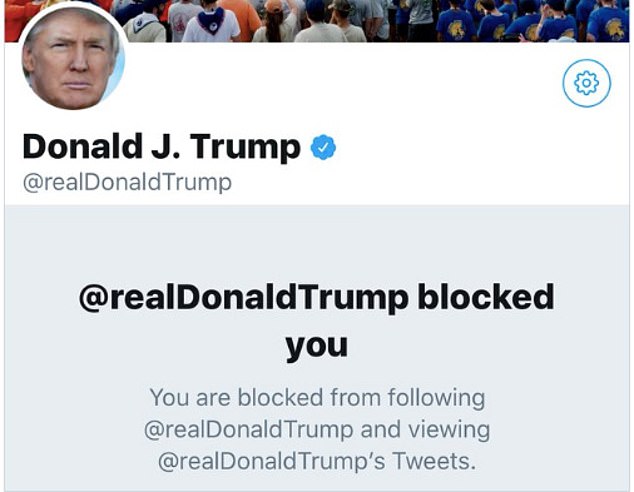A federal appeals court ruled today that Donald Trump cannot block his critics on Twitter.
The decision from the New York appeals court upholds an earlier ruling that deems the president violated the First Amendment by blocking individual users from the Twitter feed he uses to communicate with the public.
The appeals court judge said that if a public official uses a social media platform to conduct official business, then by blocking individuals they are cutting off citizens from open dialogue.
‘The First Amendment does not permit a public official who utilizes a social media account for all manner of official purposes to exclude persons from an otherwise open online dialogue because they expressed views with which the official disagrees,’ Judge Barrington Parker wrote in the unanimous decision from the U.S. Court of Appeals for the 2nd Circuit.
Seven people who were blocked from the president’s @realDonaldTrump account after posting disapproving comments originally brought the case in 2017.
The lower court ruled Trump’s actions unconstitutional and ordered he unblock all those he blocked.
“Public officials’ social media accounts are now among the most significant forums for discussion of government policy,” Jameel Jaffer, the Knight Institute’s executive director, who argued the case before the 2nd Circuit panel in March, said in a statement.
“This decision will ensure that people aren’t excluded from these forums simply because of their viewpoints, and that public officials aren’t insulated from their constituents’ criticism,” Jaffer said. “The decision will help ensure the integrity and vitality of digital spaces that are increasingly important to our democracy.”
Some high profile individuals Trump has blocked at one point in time include author Stephen King, model Chrissy Teigen, actress Rosie O’Donnell and journalist Lauren Wolfe, among several others.
‘Trump has blocked me from reading his tweets. I may have to kill myself,’ King wrote when he found out he was blocked by the president.
Tiegen noted when she was blocked, that the final straw for Trump was when she said that no one likes him.
‘After 9 years of hating Donald J Trump, telling him ‘lol no one likes you’ was the straw,’ she tweeted in 2017.
The case could have implications for how elected officials interact with constituents online – especially those who are critical of the official and their policies.
The First Amendment prevents ‘viewpoint discrimination,’ which is a provision that blocks the government in power and specific officials from excluding or blocking views they disagree with.
The Supreme Court has not yet taken on a case that would directly address how this law is applied to social media and other online platforms.
